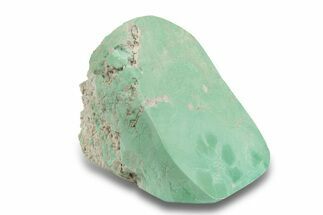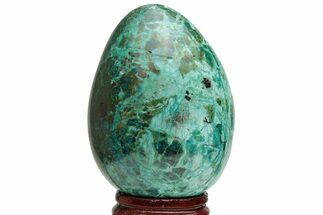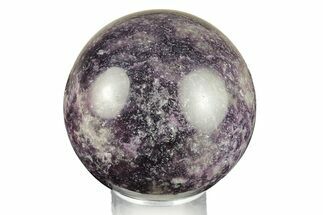2.4" Polished Green Actinolite Egg - California
This is a polished egg made from a massive formation of green actinolite, collected in California. It measures 2.4" tall and comes with an acrylic ring display stand.
About Actinolite
Actinolite is a green, fibrous to columnar mineral belonging to the amphibole group, commonly found in metamorphic rocks. Its color ranges from pale to dark green, depending on its iron content, with a glassy to silky luster. Actinolite forms long, slender crystals or needle-like fibers, often creating a fibrous or radial texture within rocks. Chemically, it is a calcium magnesium iron silicate with the formula Ca₂(Mg,Fe)₅Si₈O₂₂(OH)₂.
This mineral typically forms during the low to medium-grade metamorphism of magnesium-rich rocks, such as limestone and dolomite, when exposed to moderate heat and pressure. Actinolite is a common component of greenschist and amphibolite facies rocks, often associated with minerals like chlorite, epidote, and albite. Actinolite is also notable for its role in the formation of jade, as it is closely related to nephrite jade, sharing a similar structure and composition.
While actinolite is valued in mineral collections for its striking color and crystal forms, some varieties are fibrous and may pose health risks if inhaled, as they are a type of asbestiform mineral. However, non-fibrous forms are considered safe and are sometimes used in jewelry and ornamental carvings.
Actinolite is a green, fibrous to columnar mineral belonging to the amphibole group, commonly found in metamorphic rocks. Its color ranges from pale to dark green, depending on its iron content, with a glassy to silky luster. Actinolite forms long, slender crystals or needle-like fibers, often creating a fibrous or radial texture within rocks. Chemically, it is a calcium magnesium iron silicate with the formula Ca₂(Mg,Fe)₅Si₈O₂₂(OH)₂.
This mineral typically forms during the low to medium-grade metamorphism of magnesium-rich rocks, such as limestone and dolomite, when exposed to moderate heat and pressure. Actinolite is a common component of greenschist and amphibolite facies rocks, often associated with minerals like chlorite, epidote, and albite. Actinolite is also notable for its role in the formation of jade, as it is closely related to nephrite jade, sharing a similar structure and composition.
While actinolite is valued in mineral collections for its striking color and crystal forms, some varieties are fibrous and may pose health risks if inhaled, as they are a type of asbestiform mineral. However, non-fibrous forms are considered safe and are sometimes used in jewelry and ornamental carvings.
 Reviews
Reviews









